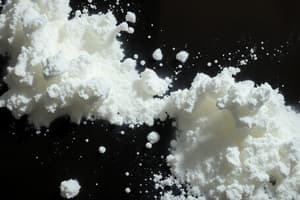Podcast
Questions and Answers
What determines the state of a substance?
What determines the state of a substance?
- Number of atoms or molecules
- Intermolecular forces and molecular interactions (correct)
- Chemical composition
- Thermal energy and motion of particles
Why do individual water molecules not exhibit wetting properties?
Why do individual water molecules not exhibit wetting properties?
- Because individual molecules lack H2O composition
- Intermolecular forces prevent wetting at the molecular level
- Due to the different physical properties in bulk compared to individual molecules (correct)
- The absence of thermal energy in single molecules
In what way do ice, water, and steam differ despite having the same chemical composition?
In what way do ice, water, and steam differ despite having the same chemical composition?
- They vary in chemical composition
- Each has unique intermolecular forces
- Their states of matter are distinct
- They have different physical properties (correct)
Why is it essential for a chemist to understand the nature of intermolecular forces and molecular interactions?
Why is it essential for a chemist to understand the nature of intermolecular forces and molecular interactions?
What do the characteristics of particles of matter described in the text suggest about matter?
What do the characteristics of particles of matter described in the text suggest about matter?
How does the dissolving of common salt in water illustrate the nature of matter particles?
How does the dissolving of common salt in water illustrate the nature of matter particles?
What happens to the volume of a liquid when sugar is dissolved in water, according to the text?
What happens to the volume of a liquid when sugar is dissolved in water, according to the text?
What role does kinetic energy play in the movement of matter particles?
What role does kinetic energy play in the movement of matter particles?
Why is it difficult to move a hand through a solid block of wood?
Why is it difficult to move a hand through a solid block of wood?
What is indicated by the rate of mixing being faster in hot water compared to cold water?
What is indicated by the rate of mixing being faster in hot water compared to cold water?
Which of the following best describes the concept of bulk properties of matter?
Which of the following best describes the concept of bulk properties of matter?
What is the significance of understanding intermolecular forces and molecular interactions for a chemist?
What is the significance of understanding intermolecular forces and molecular interactions for a chemist?
Why do ice, water, and steam exhibit very different physical properties despite having the same chemical composition?
Why do ice, water, and steam exhibit very different physical properties despite having the same chemical composition?
In what way does thermal energy affect the motion of particles in matter?
In what way does thermal energy affect the motion of particles in matter?
What do the characteristics of particles of matter described in the text indicate about the nature of common salt?
What do the characteristics of particles of matter described in the text indicate about the nature of common salt?
How do the characteristics of particles of matter explain the phenomenon observed when sugar is dissolved in water?
How do the characteristics of particles of matter explain the phenomenon observed when sugar is dissolved in water?
In what way does the rate of mixing illustrate the kinetic energy of matter particles?
In what way does the rate of mixing illustrate the kinetic energy of matter particles?
How do the interparticle forces in a solid block of wood affect its physical properties?
How do the interparticle forces in a solid block of wood affect its physical properties?
What role do forces of attraction between particles play in the behavior of matter?
What role do forces of attraction between particles play in the behavior of matter?
Why do particle characteristics suggest that water is not continuous but made up of small particles?
Why do particle characteristics suggest that water is not continuous but made up of small particles?
Flashcards are hidden until you start studying




